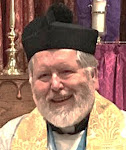"Behold, the Lamb of God . . ."
May 2008 at St Stephen's Coomera, Quseensland
Be pleased, O Lord, to accept this our bounden duty and service, and command that the prayers and supplications, together with the remembrance of Christ’s passion, which we now offer unto thee, may be received into thy heavenly Tabernacle; and that thou, not weighing our own merits, but looking upon the blessed sacrifice of our Saviour, which was once fully and perfectly made for us all, mayest pardon our offences, and replenish us with thy grace and heavenly benediction, through the same Christ our Lord. Amen.
- John Cosin (1594-1672)
* * * * * * * * * *
Evelyn Underhill defines Christian worship as ‘the total adoring response of man to the one eternal God self-revealed in time.’ This response is seen perfectly in Christ: ‘Lo, I have come to do thy will, O God’ (Hebrews 10:5-9). The whole life of our Lord Jesus Christ is an act of worship: his obedience, his ministry, his self-offering on Calvary. We can also say that it is a liturgical act of worship which is expressly articulated in the words of Jesus’ High-Priestly prayer in John 17:1-5.
‘In Christ’ (2 Corinthians 5:17) we enter the stream of obedience, devotion and love flowing from the Son to his Father. Therefore true worship is union with our Lord in the Holy Spirit, identifying ourselves with the Perfect Sacrifice of Jesus Christ, which is why the Eucharist will always be the most perfect form of worship.”
- Frank Lomax (1921-2007), in Worship and Liturgy (Lecture, Trinity Theological College, Singapore)
* * * * * * * * * *
The Eucharist is the completion of all the sacraments, and not simply one of them . . . All human striving reaches here its ultimate goal. For in this sacrament we attain God himself, and God himself is made one with us in the most perfect of all unions . . . This is the final mystery; beyond this it is not possible to go, nor can anything be added to it.
- St Nicholas Cabasilas (1320-1371), quoted in The Orthodox Way by Kallistos Ware, p. 116
* * * * * * * * * *
The eternal liturgy . . . is the work of Jesus our Great High Priest, offering himself in and through his Church to the Father in the union of the Holy Spirit. ‘Through him, with him, in him . . .’ At the end of the eucharistic prayer, the priest raises the Host and Chalice together, and the self-giving or oblation of the whole Church is represented, taken up into the sacrificial self-giving love of the Blessed Trinity. The whole assembly responds with the great ‘Amen!’, the resounding ‘Yes!’ of the faith of a priestly people.”
- Peter Elliott, in Priest, Sacrifice and Eucharist, 2001
* * * * * * * * * *
The Eucharist is “surrounded by temporal ripples through which past and future things are refracted.”
- Robert Sokolowski (1936-), in Eucharistic Presence: A Study in the Theology of Disclosure, p. 105
* * * * * * * * * *
“. . . the whole of Christian worship is focussed upon an altar where there is perpetually set forth the redemptive offering of pure love; and in that eternal offering, all other movements of love and sacrifice are sanctified before God.”
- Evelyn Underhill (1875-1941), in Worship, p. 149
* * * * * * * * * *
Christ was the Word that spake it;
He took the bread and break it;
And what that Word did make it;
That I believe and take it.
- Attributed to Queen Elizabeth 1 (1533-1603)
* * * * * * * * * *
Above, the hosts of angels sing praise; below, men form choirs in the churches and imitate them by singing the same doxology. Above, the seraphim cry out in the thrice-holy hymn; below, the human throng sends up the same cry. The inhabitants of heaven and earth are brought together in a common assembly; there is one thanksgiving, one shout of delight, one joyful chorus.”
- St John Chrysostom (c. 347–407), in his Homily on Isaiah 6:1
* * * * * * * * * *
In the bread of the Eucharist
and the cup of blessing
Christ’s presence is revealed at its most intense.
Let your life be permeated
with a tremendous reverence
towards this mystery of faith.
Your adoration needs no justification
more than your love and wonder
for the infinite, delicate grandeur of God,
the unfathomable depths of Christ’s gifts.
Let his praise not depart from your lips . . .
The Eucharist sets you on the way of Christ.
It takes you into his redeeming death
and gives you a share
in the most radical deliverance possible.
And already the light of the resurrection,
the new creation,
is streaming through it from beyond.
Whenever you sit at table with the risen Lord,
it is the first day of the week,
very early in the morning.
- H. Van Der Looy in Rule for a New Brother


















0 comments:
Post a Comment